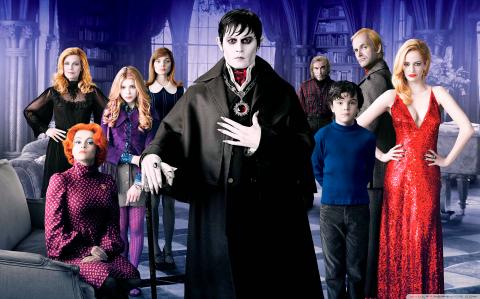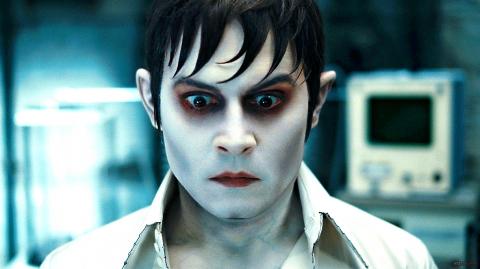Tim Burton and Johnny Depp are snuggled warmly in their comfort zone in the chilly horror-comedy Dark Shadows, their eighth collaboration as director and star, respectively, and their weakest by far.
You don’t need to know a thing about the late-1960s Dark Shadows TV series that provides the inspiration. Tonally, thematically, visually, you’ve seen this movie before, with its oddball characters, skies in varying shades of gray and a foreboding sense of gothic mystery. No one gets challenged here; no one gets pushed.
It’s actually a wonder that Depp hasn’t played a vampire before; still, his long-undead Barnabas Collins, who’s been buried alive for nearly two centuries and suddenly finds himself back in his insular Maine hometown in 1972, fits squarely within his well-honed on-screen persona. He thinks he’s quite the charmer, but he’s actually a bit awkward, and that contradiction provides the main source of humor.

Photo courtesy of Warner
Or at least, it’s supposed to.
The script from Seth Grahame-Smith (Abraham Lincoln: Vampire Hunter) allows its family full of weirdos to shine intermittently but they rarely interact with each other; each functions in his or her own self-consciously quirky bubble. Too often, Dark Shadows is crammed with hacky, obvious, fish-out-of-water gags, as Barnabas tries to make sense of this strange new world. He struggles to understand modern romance as he courts the family’s delicate, wide-eyed nanny and hopes to fit in by smoking pot with the local hippies. And how is this tiny Karen Carpenter person singing to him from inside the television set? Ho ho!
At the same time, Dark Shadows feels too languid, bogged down as it is with an obsessive eye for period costumes (the work of Colleen Atwood) and interior details rather than offering anything resembling an engaging story. And by the time Burton finally puts his patented flair for visual effects to its best use, in a climactic showdown between Barnabas and the witch who cursed him (the va-va-voomy Eva Green), it’s too late.

Photo courtesy of Warner
A little background here: As a child, Barnabas and his wealthy family sailed from England in 1750 and founded the fishing village of Collinsport in coastal Maine. They spent 15 years building the grand Collinwood Manor, where a maid named Angelique (Green) loved Barnabas passionately, but he never returned her affections. Because she felt scorned — and happened to be a witch — she turned him into a vampire, chained him up and stuck him in a coffin in the ground. Nearly 200 years later, a construction crew unearths him and sets him free.
When he stumbles back to his once-stately home, he finds it falling apart, along with the fishing empire that has been conquered by a competitor named Angel (Green, again). The few family members who remain are random and reclusive: matriarch Elizabeth Collins Stoddard (Michelle Pfeiffer), the only one who knows his true identity; her weasel of a brother, Roger (Jonny Lee Miller); her rebellious teen daughter, Carolyn (Chloe Grace Moretz); and Roger’s 10-year-old son David (Gully McGrath), who sees dead people. There’s also David’s perpetually drunk psychiatrist, Dr Julia Hoffman (Burton regular Helena Bonham Carter); the home’s beleaguered caretaker, Willie (Jackie Earle Haley); and the new governess, Victoria (Bella Heathcote), who bears a striking resemblance to Barnabas’ long-ago love and has a few secrets of her own.
That’s a lot of exposition, huh? And the film itself takes awhile to get going as it establishes all those characters and back stories. Once there, it seems to have nowhere to go — out of the shadows or into the light, it doesn’t really matter either way.

From the last quarter of 2001, research shows that real housing prices nearly tripled (before a 2012 law to enforce housing price registration, researchers tracked a few large real estate firms to estimate housing price behavior). Incomes have not kept pace, though this has not yet led to defaults. Instead, an increasing chunk of household income goes to mortgage payments. This suggests that even if incomes grow, the mortgage squeeze will still make voters feel like their paychecks won’t stretch to cover expenses. The housing price rises in the last two decades are now driving higher rents. The rental market

July 21 to July 27 If the “Taiwan Independence Association” (TIA) incident had happened four years earlier, it probably wouldn’t have caused much of an uproar. But the arrest of four young suspected independence activists in the early hours of May 9, 1991, sparked outrage, with many denouncing it as a return to the White Terror — a time when anyone could be detained for suspected seditious activity. Not only had martial law been lifted in 1987, just days earlier on May 1, the government had abolished the Temporary Provisions Effective During the Period of National Mobilization for Suppression of the Communist

When life gives you trees, make paper. That was one of the first thoughts to cross my mind as I explored what’s now called Chung Hsing Cultural and Creative Park (中興文化創意園區, CHCCP) in Yilan County’s Wujie Township (五結). Northeast Taiwan boasts an abundance of forest resources. Yilan County is home to both Taipingshan National Forest Recreation Area (太平山國家森林遊樂區) — by far the largest reserve of its kind in the country — and Makauy Ecological Park (馬告生態園區, see “Towering trees and a tranquil lake” in the May 13, 2022 edition of this newspaper). So it was inevitable that industrial-scale paper making would

Hualien lawmaker Fu Kun-chi (傅?萁) is the prime target of the recall campaigns. They want to bring him and everything he represents crashing down. This is an existential test for Fu and a critical symbolic test for the campaigners. It is also a crucial test for both the Chinese Nationalist Party (KMT) and a personal one for party Chairman Eric Chu (朱立倫). Why is Fu such a lightning rod? LOCAL LORD At the dawn of the 2020s, Fu, running as an independent candidate, beat incumbent Democratic Progressive Party (DPP) lawmaker Hsiao Bi-khim (蕭美琴) and a KMT candidate to return to the legislature representing